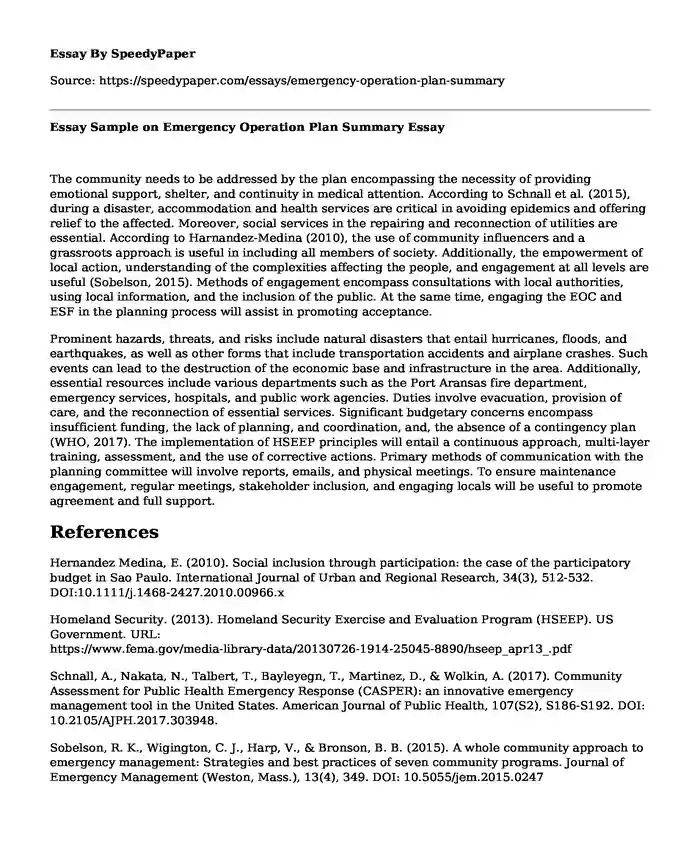
| Type of paper: | Presentation |
| Categories: | Mental health Disaster Healthcare policy Community health |
| Pages: | 2 |
| Wordcount: | 423 words |
The community needs to be addressed by the plan encompassing the necessity of providing emotional support, shelter, and continuity in medical attention. According to Schnall et al. (2015), during a disaster, accommodation and health services are critical in avoiding epidemics and offering relief to the affected. Moreover, social services in the repairing and reconnection of utilities are essential. According to Harnandez-Medina (2010), the use of community influencers and a grassroots approach is useful in including all members of society. Additionally, the empowerment of local action, understanding of the complexities affecting the people, and engagement at all levels are useful (Sobelson, 2015). Methods of engagement encompass consultations with local authorities, using local information, and the inclusion of the public. At the same time, engaging the EOC and ESF in the planning process will assist in promoting acceptance.
Prominent hazards, threats, and risks include natural disasters that entail hurricanes, floods, and earthquakes, as well as other forms that include transportation accidents and airplane crashes. Such events can lead to the destruction of the economic base and infrastructure in the area. Additionally, essential resources include various departments such as the Port Aransas fire department, emergency services, hospitals, and public work agencies. Duties involve evacuation, provision of care, and the reconnection of essential services. Significant budgetary concerns encompass insufficient funding, the lack of planning, and coordination, and, the absence of a contingency plan (WHO, 2017). The implementation of HSEEP principles will entail a continuous approach, multi-layer training, assessment, and the use of corrective actions. Primary methods of communication with the planning committee will involve reports, emails, and physical meetings. To ensure maintenance engagement, regular meetings, stakeholder inclusion, and engaging locals will be useful to promote agreement and full support.
References
Hernandez Medina, E. (2010). Social inclusion through participation: the case of the participatory budget in Sao Paulo. International Journal of Urban and Regional Research, 34(3), 512-532. DOI:10.1111/j.1468-2427.2010.00966.x
Homeland Security. (2013). Homeland Security Exercise and Evaluation Program (HSEEP). US Government. URL: https://www.fema.gov/media-library-data/20130726-1914-25045-8890/hseep_apr13_.pdf
Schnall, A., Nakata, N., Talbert, T., Bayleyegn, T., Martinez, D., & Wolkin, A. (2017). Community Assessment for Public Health Emergency Response (CASPER): an innovative emergency management tool in the United States. American Journal of Public Health, 107(S2), S186-S192. DOI: 10.2105/AJPH.2017.303948.
Sobelson, R. K., Wigington, C. J., Harp, V., & Bronson, B. B. (2015). A whole community approach to emergency management: Strategies and best practices of seven community programs. Journal of Emergency Management (Weston, Mass.), 13(4), 349. DOI: 10.5055/jem.2015.0247
World Health Organization. (2017). A strategic framework for emergency preparedness. WHO Document Production Services, Geneva: Switzerland.
Cite this page
Essay Sample on Emergency Operation Plan Summary. (2023, Feb 03). Retrieved from https://speedypaper.com/essays/emergency-operation-plan-summary
Request Removal
If you are the original author of this essay and no longer wish to have it published on the SpeedyPaper website, please click below to request its removal:
- History of Coffee Essay Sample
- To ID or Not To ID by Cal Thomas, Free Essay Analysis
- Essay Sample about Early Childhood Curriculum. A Child's Connection to the World.
- Free Essay: Business Individual Reflective Learning Portfolio
- Free Essay on the Hospital Compare Website: Performance Measurement Summary
- Essay Sample: Should World War II Be Remembered in American History as the "Good War"?
- Enhancing Health Information Management and Exchange for Children with Tracheotomy - Essay Sample
Popular categories




